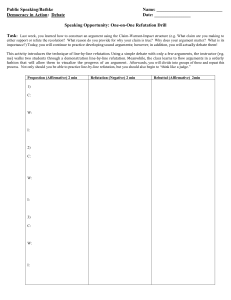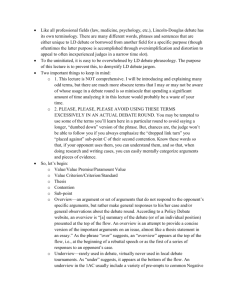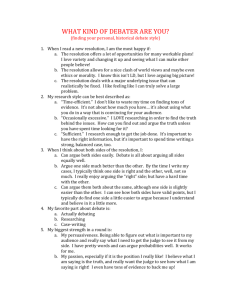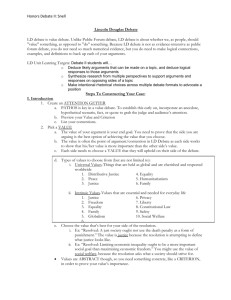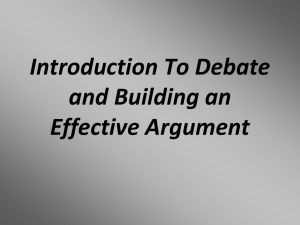The Value/Criterion Debate.
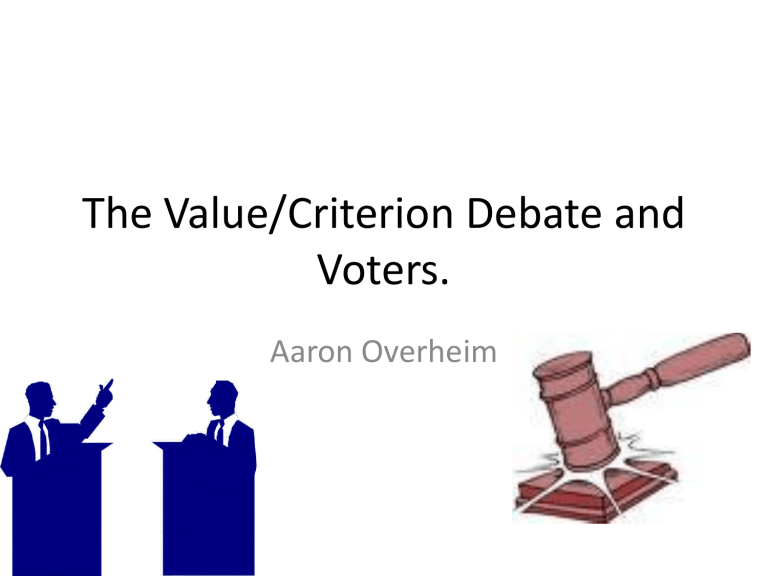
The Value/Criterion Debate and
Voters.
Aaron Overheim
You will do this or you will lose
• The most crucial part of L.D. is the Value and
Criterion debate.
• You must defend it from every single argument that appears during the round. If you fail to do so you will likely lose the round.
After which, you will feel very sad and neither the judge nor your opponent will feel any remorse for your loss.
Some Important Things to Know
• Offense – these are the arguments which act as a detriment to/attack on to your opponent’s side of the debate round.
• Offense is important to have in the round.
You must attack the V/C of your opponent with multiple arguments. This forces your opponent to spend time defending his V/C instead of attacking your case.
Some Important Things to Know
• Weighing arguments – weighing arguments is a very simple thing to do. The basic premise of this is to show what the impacts are and how they affect the net benefits for each side. For example if you win that your opponent’s case will destroy human rights and that is his value, you will probably win the round.
• Whenever you win an argument on the contention level you should impact this back to the V/C.
Some Important Things to Know
• Link – This is how two or more of your arguments relate to one another.
• Links are very important during a round because they help you to explain the relevance of your claims and impacts in the round.
• You should try to break your opponent’s links and defend your own.
Ways to Not Fail
• The best way to win this debate is to have a solid link from all of your offense in the round to your criterion and back to your value.
• Even if you are losing all of those arguments these links will make it much easier to convince the judge that you are winning the round.
• This is because it will actually sound like you understand what is going on and will give off a sense of confidence which can convince a judge that you’re winning the round, even if you aren’t.
Ways to Not Fail Continued...
• Make sure to ALWAYS LINK YOUR VALUE BACK
TO THE RESOLUTION.
• You might as well just walk up to the judge and sign the ballot for your opponent and save yourself the trouble if you do this.
Important links to be made during a round
Make a clear link from your
Criterion to your Value.
ALWAYS make a
clear link your
Value back to the resolution.
Make a clear
Link from your
Contentions back to your
Criterion AND
Value.
Ways to Not Fail Continued...
• Being non-topical leaves the debate round open for arguments about whether or not you are following the lines of the resolution which, if you don’t have a proper link, is rather hard to defend.
Ways to Not Fail Continued...
• Finally, ALWAYS WEIGH BOTH OPPOSING
VALUES AND CRITERIA.
• This is probably the biggest mistake that everyone makes at some point in their L.D. career.
Ways to Not Fail Continued...
• You must explicitly tell the judge why your value is better by showing them how all of the positive impacts flow to you’re value while all of the negative impacts flow to your opponents.
• This gives the judge a clearer view of the debate round.
• If done correctly, the win will more likely be in your favor.
VOTERS
• Very simply put, voters are the reasons why the judge should vote for your side of the debate round.
• This is an easy way to make the judge believe that you are winning the round, so ALWAYS
DO IT.
VOTERS CONTINUED…
• Most judges will be looking for these during your rebuttals. So just assume that all of them
WILL vote on the fact that you did not have voters.
• Not having them will be a major detriment to you at the end of the round.
